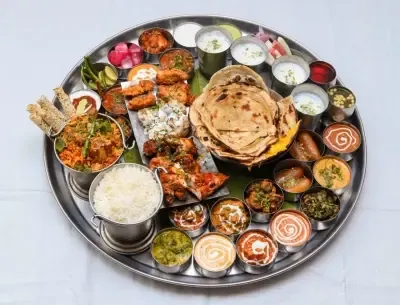Why Did the Cost of Home-Cooked Thalis Drop This July?

Synopsis
Key Takeaways
- The cost of home-cooked vegetarian thalis dropped by 14% in July.
- Non-vegetarian thali prices fell by 13%.
- Significant drops in vegetable prices, especially tomatoes, onions, and potatoes, influenced the decline.
- Pulse prices decreased by 14% year-on-year.
- Higher vegetable oil prices continue to affect overall thali costs despite lower customs duties.
New Delhi, Aug 7 (NationPress) The expense of home-prepared vegetarian and non-vegetarian thalis saw a decline of 14 percent and 13 percent, respectively, in July this year when compared to the same month in the previous year. This reduction is attributed to favorable commodity prices, as reported by Crisil's monthly food plate cost indicator.
The drop in vegetarian thali costs year-on-year was significantly influenced by a steep decline in vegetable prices, particularly for tomato, onion, and potato (TOP). In July, tomato prices fell by 36 percent, dropping to Rs 42 per kg from Rs 66 per kg. This decline was primarily due to a high base effect, as prices typically rise during July/August due to seasonal factors, even exceeding Rs 100 per kg in 2023.
Similarly, potato and onion prices saw annual decreases of 30 percent and 36 percent, respectively, also influenced by a high base. In the previous year, potato production was affected by blight infestations and adverse weather, leading to increased prices. For onions, an 18-20 percent rise in annual production contributed to the price reduction in 2025.
The prices of pulses also fell by 14 percent year-on-year, propelled by increased production and stock levels compared to the previous year, while rice prices reduced by 4 percent.
The decrease in non-vegetarian thali costs was primarily due to lower vegetable prices and an estimated 12 percent year-on-year drop in broiler prices, which account for roughly 50 percent of its total cost, as indicated in the report.
Yet, despite a reduction in the basic customs duty (BCD) on crude edible oils, vegetable oil prices surged by 20 percent year-on-year, as the benefits of the lower BCD have not yet been fully passed on to consumers. Additionally, a 6 percent year-on-year increase in liquefied petroleum gas cylinder prices hampered the overall decline in thali costs, according to the Crisil report.










